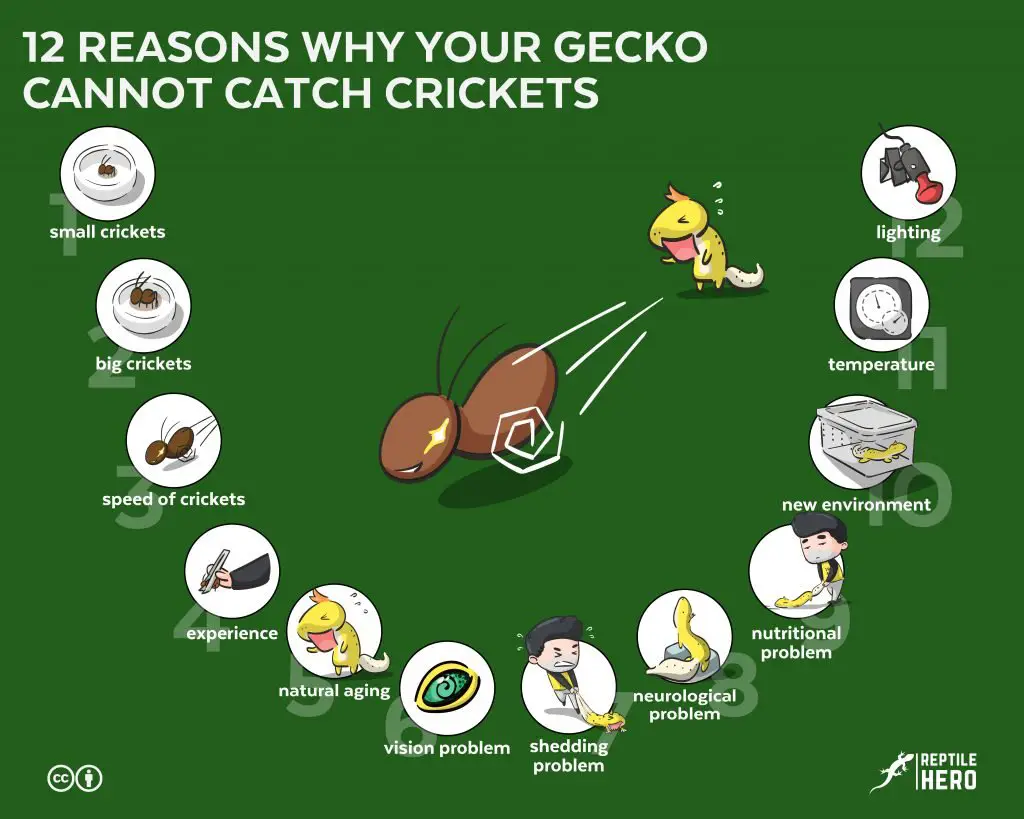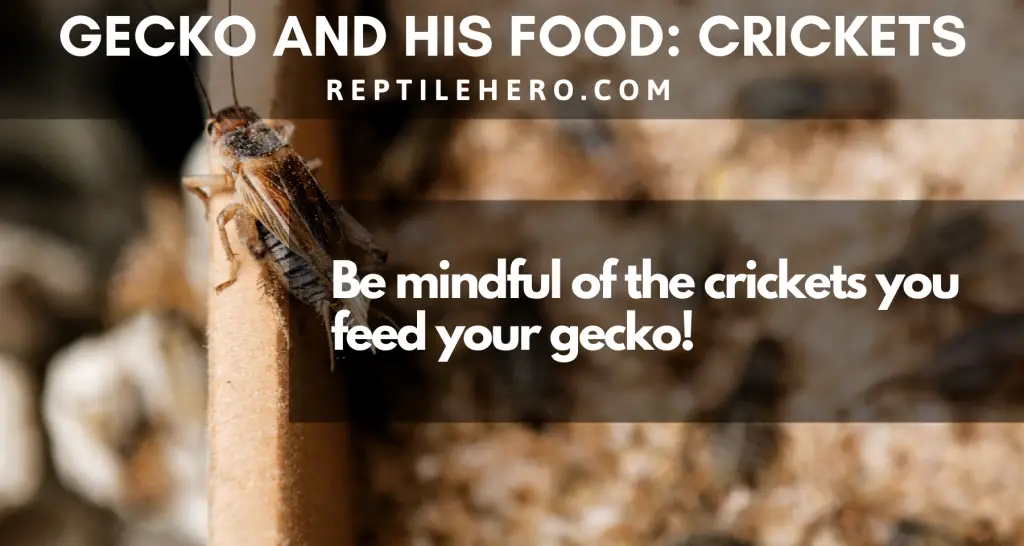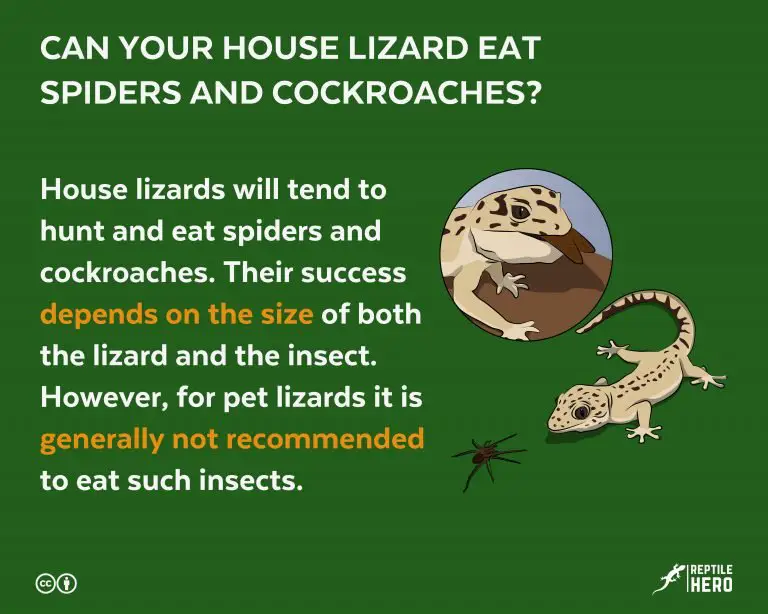12 Reasons Why Your Gecko Cannot Catch Crickets
Finally, you are accustomed to taking care of your new family member—a gecko. After settling into the new environment, he has loosened up a bit. You feed him with worms; then, you slowly diversify his meals by giving insects like crickets. But you noticed something is off the hook; he cannot catch it!
The cause of a gecko’s inability to catch crickets varies. There are 12 reasons that commonly pose a risk:
- small crickets
- big crickets
- speed of crickets
- experience
- natural aging
- vision problem
- shedding problem
- neurological problem
- nutritional problem
- new environment
- temperature
- lighting
Fret not; we are here to discuss all of these as we go along.
Possible Causes Why Your Gecko Is Unable To Catch Crickets
Before you start panicking and assuming for the worst-case scenario, it is essential to verify that you have adequately observed the basic guide sheet on taking care of your little one. If nothing seems to be wrong with what you are doing, then here are 12 causes you may consider addressing.

The Crickets
Crickets, just like any living thing, also come in varying sizes. You may be unaware, but when the size of the cricket you feed your gecko does not match his age and size, he may undoubtedly be unsuccessful in catching the insect. As a rule of thumb, you must not feed crickets bigger than the space between his eyes.
Here are three points to consider about the crickets you give:
1. Small Crickets
If the cricket is too small, the tendency is that your gecko cannot see it accurately. This circumstance eventually leads to him ignoring the insect or him attempting to chase it to no avail. To help him, try putting the smaller crickets in a feeder dish so that he can see them immediately.
2. Big Crickets
If the cricket is too big, chances are your gecko’s mouth hampers a full grip around the insect to take a bite. When this happens, he cannot cause injury to slow it down, eventually releasing the cricket from his mouth. To assist him, try immobilizing the cricket by cutting the legs off of its body.
3. Speed
It may be worth mentioning that the speed of the crickets also matters. No matter the size, the fast crickets are indeed tedious to catch for your hungry pet. To deal with this, try putting the crickets in the fridge for 10-15 minutes. The low temperature slows them down, enabling your gecko to catch them more easily.

The Gecko
Now, you have checked the crickets you stocked up from the pet store. Everything seems to be okay, but you still have no idea what is happening!
Then, it is time to investigate your pet gecko for any unnatural behaviour. Just like us, your gecko’s health condition may be affecting his appetite.
4. Experience
Do you remember the time when your mum taught you how to hold the spoon and fork, yet you consistently insist on being spoon-fed? Like how we were back then as toddlers, baby and juvenile geckos may lack experience hunting for food and may prefer to be mouth-fed.
The inability to capture a cricket may also be because your pet relies on forceps-feeding. Though it helps to forceps-feed him at times with dead crickets, he may grow dependent on this method to the point of refusing to hunt the live crickets you put inside the tank.
By only gaining adequate experience can your gecko become a good hunter. Hence, with ample time to practice on smaller and slower prey like mealworms, he may develop the instinct to react once crickets are in the tank. Take note that you can only feed mealworms a couple of times.
5. Natural Ageing
Like humans, as geckos age, complications that come with ageing pose risks. For instance, older ones do not move as much as the juveniles. Due to old age, they tend to exert less effort in hunting live crickets. Hence, you may see them dozing off despite the swarm of insects.
Despite taking care of him properly, once your gecko has reached that age in his life, there is not a thing you can do to make him catch the cricket. As ageing is a natural process, forceps-feeding him with the insect may be the best option left.
6. Vision Problem
While each gecko is unique and does not possess the same physical qualities and characteristics, it is only unbiased to consider that some morphs are more susceptible to vision problems than others.
Have you looked into your pet’s body colour? Is it creamy and pale or vibrant and decorative? How about his eyes? Are his eyes light yellow, orange, or pink with light orange or brown markings or pale and silver with prominent red veins?
If you answered the latter for the two questions, your gecko might be an albino. Generally, albino geckos have heightened sensitivity to light due to the lack of melanin pigment in their eyes. This incident affects their focusing and depth perception. As a result, they may have difficulty catching fast-moving prey.
To help your gecko, feeding him under less intense light conditions may help him catch the crickets. In this way, you reduce the eyestrain enabling him to focus his eyesight better.
7. Shedding Problem
If your gecko is healthy, his old skin must come off all at once, not in pieces, once he sheds off. However, if there are any underlying health issues or deficiencies to cause his skin to fall off in chunks, further complications may arise if you ignore the old skin stuck on certain parts of the body.
For example, old skin stuck around your gecko’s eye area may cause acquired vision problems. If so, this may explain why he struggles to catch crickets that are even compatible with his size.
Dealing with this cannot be done on your own. It is never advisable to pull the old skin off by yourself forcefully, so you better visit a veterinarian for a proper and safe procedure.
8. Neurological Problem
One of the possible severe health issues causing your pet gecko to miss catching crickets is Enigma Syndrome (ES), a neurological disorder. In ES, your gecko’s balance and cognition are affected. It is more dominant in the enigma morph. However, other Leo morphs can get it too.
To check the possibility for your pet of having this syndrome, beware of these clinical signs:
- circling
- death rolls
- head tilting
- inability to catch prey
- seizures
- star gazing
As this is not a curable disorder either, the only way to help your pet gecko is to make sure his life is more convenient.
For instance, having a simple setup and using a paper towel for the substrate are recommended. Feeding with mobile crickets is not advisable to reduce stress. If you want to provide him with crickets, do so by forceps-feeding him.
9. Nutritional Problem
Other possible serious health issues relating to your gecko’s inability to capture a cricket may be due to nutritional secondary hyperparathyroidism, also known as Metabolic Bone Disease (MBD). This condition is unfortunately common to captive geckos fed with crickets and mealworms.
The root cause of having MBD is due to failure to provide the proper requirements for calcium metabolism. This phenomenon leads to bone demineralisation.
Before you can be sure that your gecko has this illness, you must watch out for the following symptoms:
- anorexia
- inability to raise his body off the ground
- lethargy
- misshapen limbs
- reluctance to move
- stuck sheds
If your gecko is diagnosed with this condition, prioritise proper treatment to ensure his health does not worsen. Cricket-catching may have to wait until he has fully recovered.
For any health-related concerns regarding your pet, it is always best to consult an exotic pet veterinarian to professionally address the underlying cause. Never self-medicate your loved ones to avoid aggravating the problem!
The Habitat
Still, after checking your little one for any health abnormalities, nothing matches your situation.
Perhaps it is now time to examine his terrarium. Just as our house may cause us inconvenience, some factors in his habitat may be triggering him to feel unnatural.
10. New Environment
Have you ever found yourself unable to defecate after arriving in the hotel room for vacation, only able to do so after a day or two? Similarly, your gecko also has an adjustment period for everything—including his appetite, especially when transferred from one owner to another.
When you observe your new pet unable to catch crickets, provided that it was known to capture one in his previous tank, all you can do is give him time to adapt to the new environment.
With your designated feeding times, it can take at least a week for him to settle to your routine in the new enclosure. Otherwise, forcefully feeding him with crickets despite his apparent refusal may bring him stress, which you do not want to happen.
11. Temperature
Unlike humans, geckos are ectothermic poikilotherms, meaning they cannot generate their body heat, and they solely depend on the environmental temperatures to keep them warm. Thus, their terrarium must have a temperature within the desirable range for optimum activity.
If your terrarium’s nighttime temperature falls below 70°F, it may hinder your gecko from catching the cricket. As the temperature drops below his preference, this may cause him to move less, hence, not reacting to the insect.
Ensuring proper temperatures by installing thermometers in the different parts of the terrarium may help alleviate this issue if it is causing him to be less motile. Observe if he will react to the cricket once the temperatures are adjusted accordingly.
12. Lighting
If you ever believed the common myth that geckos do not need proper light at night because they are “nocturnal,” then you must stop thinking about it.
Geckos need a 4-element setup to mimic their natural habitat. In case you have overlooked any of the five, here is an example to follow:
- A full-spectrum UVA which simulates daylight
- A ceramic bulb which heats the tank all-day
- A night light that helps you view your pet at night
- Thermostat and timer to automatically control the setup
If you missed one in your pet’s terrarium, improper lighting might give him poor mental health and appetite. This condition may explain why he cannot and does not want to catch the cricket. Try following the list and see if he changes his behaviour as well.

Takeaways
- One aspect to look at in addressing the issue is cricket. Geckos may be unable to catch the insect because it is too small, too big, or too fast for the reptile.
- Aside from cricket, it is noteworthy to check the health condition of the gecko. Underlying health issues may be causing his inability to catch the insect.
- It is also essential to investigate the enclosure. There may be undesirable factors, such as temperature and lighting, which have gone unnoticed.


![Do Geckos Drink Milk? [Think it Twice]](https://www.reptilehero.com/wp-content/uploads/2021/07/Does-Gecko-Drink-Milk-Infographic-768x614.jpg)
![Homemade Crested Gecko Food [10 Recipes]](https://www.reptilehero.com/wp-content/uploads/2021/05/G47-768x614.jpg)
![Picky Eater Leopard Geckos – How To Feed it [8 Solutions]](https://www.reptilehero.com/wp-content/uploads/2021/12/picky-eater-gecko-cc-768x614.jpg)


